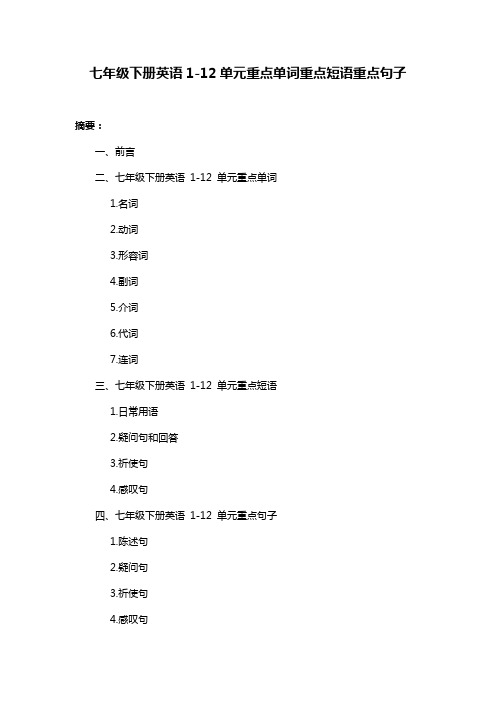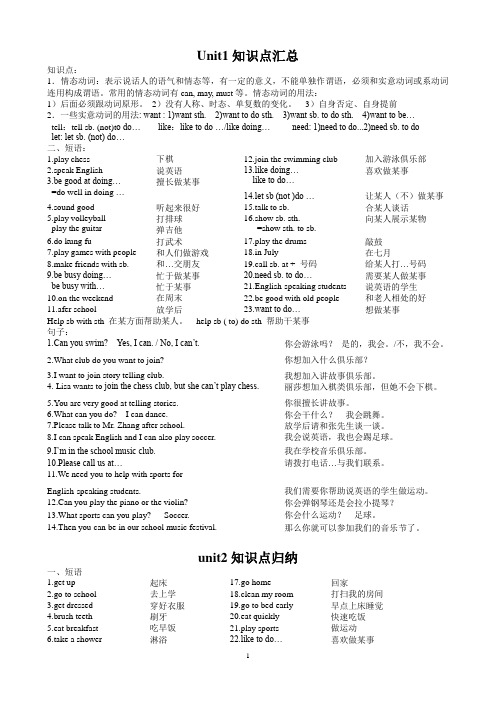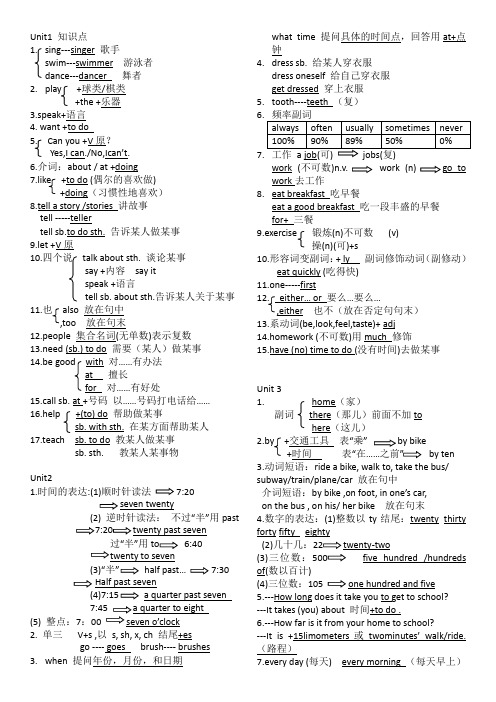新课标七年级英语下册1-12每单元知识点
- 格式:doc
- 大小:132.00 KB
- 文档页数:22

英语七下笔记1至12单元以下是英语七下1至12单元的笔记,供您参考:Unit 1:- 学习一般现在时态,描述日常习惯和喜好。
- 掌握动词be的用法,以及人称代词的主格和宾格形式。
- 学习形容词和副词的比较级和最高级形式。
Unit 2:- 学习一般过去时态,描述过去发生的事情。
- 掌握动词的过去式形式,以及过去进行时的用法。
- 学习表示时间和地点的介词和副词。
Unit 3:- 学习一般将来时态,描述未来计划和预测。
- 掌握动词的将来式形式,以及将来进行时和将来完成时的用法。
- 学习表示意愿、可能性和必要性的情态动词。
Unit 4:- 学习现在进行时态,描述正在发生的事情。
- 掌握动词的现在分词形式,以及现在进行时的用法。
- 学习表示情感和感觉的动词和形容词。
Unit 5:- 学习一般现在时态的被动语态,描述被动情况。
- 掌握动词的被动语态形式,以及by引导的方式状语从句。
- 学习表示位置和方向的介词和副词。
Unit 6:- 学习形容词和副词的用法,描述事物的性质和程度。
- 掌握形容词和副词的位置和顺序,以及比较级和最高级的用法。
- 学习表示比较关系的连词和介词。
Unit 7:- 学习代词的用法,代替名词或名词短语。
- 掌握人称代词、物主代词、反身代词和不定代词的形式和用法。
- 学习表示目的、原因、条件和结果的连词和介词。
Unit 8:- 学习定冠词和不定冠词的用法,修饰名词。
- 掌握定冠词the、不定冠词a/an的形式和用法,以及冠词的省略情况。
- 学习表示数量、种类和单位的介词和副词。

七年级下册英语1-12单元重点单词重点短语重点句子摘要:一、前言二、七年级下册英语1-12 单元重点单词1.名词2.动词3.形容词4.副词5.介词6.代词7.连词三、七年级下册英语1-12 单元重点短语1.日常用语2.疑问句和回答3.祈使句4.感叹句四、七年级下册英语1-12 单元重点句子1.陈述句2.疑问句3.祈使句4.感叹句五、学习建议正文:一、前言英语作为一门国际化的语言,在我国的基础教育中占有非常重要的地位。
对于初中生来说,英语学习是他们学习生活中不可或缺的一部分。
本文将为大家整理七年级下册英语1-12 单元的重点单词、短语和句子,希望能对大家的学习有所帮助。
二、七年级下册英语1-12 单元重点单词1.名词(1)家庭:family, father, mother, brother, sister, teacher(2)学校:school, class, student, teacher, book(3)动物:cat, dog, fish, bird, elephant2.动词(1)表示有:have, has(2)表示吃:eat, drinks(3)表示玩:play, plays3.形容词(1)表示高兴:happy, sad(2)表示美丽:beautiful, ugly(3)表示好:good, bad4.副词(1)表示很:very, so(2)表示现在:now, today(3)表示昨天:yesterday5.介词(1)表示在...里:in, on(2)表示向...:to, toward(3)表示从...:from, away6.代词(1)表示我:I, me(2)表示你:you, your(3)表示他:he, his(4)表示她:she, her(5)表示我们:we, us(6)表示你们:you, your(7)表示他们:they, their7.连词(1)表示和:and, but(2)表示如果:if, then(3)表示因为:because, so三、七年级下册英语1-12 单元重点短语1.日常用语(1)早上好:Good morning!(2)下午好:Good afternoon!(3)晚上好:Good evening!2.疑问句和回答(1)你叫什么名字?:What"s your name?(2)你来自哪里?:Where are you from?(3)这个多少钱?:How much is this?3.祈使句(1)请打开窗户:Please open the window.(2)请给我一杯水:Please give me a glass of water.(3)请坐:Please sit down.4.感叹句(1)多么漂亮的花啊!:What a beautiful flower!(2)多么可爱的狗啊!:What a cute dog!四、七年级下册英语1-12 单元重点句子1.陈述句(1)我是一名学生:I am a student.(2)她是一名教师:She is a teacher.2.疑问句(1)你叫什么名字?:What"s your name?(2)你多大了?:How old are you?3.祈使句(1)请把书给我:Please give me the book.(2)不要说话:Don"t talk.4.感叹句(1)多么美丽的景色啊!:What a beautiful view!(2)多么好吃的水果啊!:What delicious fruit!五、学习建议1.每天坚持学习,养成良好的学习习惯。

Unit1知识点汇总知识点:1.情态动词:表示说话人的语气和情态等,有一定的意义,不能单独作谓语,必须和实意动词或系动词连用构成谓语。
常用的情态动词有can, may, must等。
情态动词的用法:1)后面必须跟动词原形。
2)没有人称、时态、单复数的变化。
3)自身否定、自身提前2.一些实意动词的用法: want : 1)want sth. 2)want to do sth. 3)want sb. to do sth. 4)want to be…tell:tell sb. (not)t o do… like:like to do …/like doing… need: 1)need to do...2)need sb. to dolet: let sb. (not) do…二、短语:1.play chess 下棋12.join the swimming club 加入游泳俱乐部2.speak English 说英语13.like doing…like to do…喜欢做某事3.be good at doing…=do well in doing …擅长做某事14.let sb (not )do …让某人(不)做某事4.sound good 听起来很好15.talk to sb. 合某人谈话5.play volleyball play the guitar 打排球弹吉他16.show sb. sth.=show sth. to sb.向某人展示某物6.do kung fu 打武术17.play the drums 敲鼓7.play games with people 和人们做游戏18.in July 在七月8.make friends with sb. 和…交朋友19.call sb. at + 号码给某人打…号码9.be busy doing…忙于做某事20.need sb. to do…需要某人做某事be busy with…忙于某事21.English-speaking students 说英语的学生10.on the weekend 在周末22.be good with old people 和老人相处的好11.afer school 放学后23.want to do…想做某事Help sb with sth 在某方面帮助某人。

人教版七年级下册英语1-12单元学霸笔记Unit1小结笔记一、重点单词guitar, sing, swim, dance, join, club, story, violin, people, center, teach, musician.二、形转换:music(人) tooth(复数)swim (ing形式)art(人) piano (人) teach(人)三、短语:play chess, play the guitar, swimming club, speak English, be good at, play the drums, play the piano, play the violin, a little, do Chinese kungfu, tell stories, sounds good, students wanted, make friends, talk to sb, the girl in red, on the weekend/on weekends, English-speaking students,四、句子:1. can you swim?以及回答2. what club do you want to join?五、语法结构:1. can 的用法Can you swim?—yes, I can.Tom can sing well.I can’t draw.2. want to do sth = would like to do sthShe wants to play soccer.=She would like to play soccer.3. be good at/ with/for4. help sb (to)do sth=help sb with sthHe often helps me (to)study English.=He often helps me with my English.5.play basketball, play the guitar, play with snow,Unit2小结笔记一、重点单词:usually, forty, never, early, job, funny, exercise, best, clean, sometimes , taste, life二、词形变换:tooth(复数) early (反义词)job(同义词)run(名词)life(复数)三、短语:get up, get dressed, take a shower, radio station, at night, on weekends, half an hour, a quarter to ten, do one’s homework, take a walk, e ither…or…, lots of, go to school/work, an interesting job, eat dinner, half past six, go home, go to bed early, eat quickly, get home, after school,四、句子:1、what time do you usually get up?2、when does she go to work?3、I sometimes play basketball for half an hour.4、that’s a funny time for breakfast.五、语法结构:1、when/what time +do/does+主语+动词原形+其他?2、时间表达法:顺读法如:7:20读作seven-twenty倒读法:此方法是“先读分钟数”,再读“钟点数”,使用此方法要注意两点:A、如果分钟数在30以内,就用“分钟数+past+钟点数”表示,介词past意为“过”。

英语七下笔记1至12单元摘要:一、引言1.笔记的重要性2.英语七下笔记1-12单元的概述二、英语七下1-6单元笔记梳理1.词汇与短语2.语法与句型3.口语交际4.阅读与写作技巧三、英语七下7-12单元笔记梳理1.词汇与短语2.语法与句型3.口语交际4.阅读与写作技巧四、重点与难点解析1.词汇与短语的理解与运用2.语法结构的掌握与应用3.口语交际的注意事项4.阅读与写作技巧的实战演练五、复习与提升策略1.制定学习计划2.创造英语学习环境3.开展合作学习4.定期自测与总结六、结语1.英语学习的重要性2.鼓励与建议正文:作为一名学生,做好笔记是提高学习效果的关键之一。
本文将对英语七下1至12单元的笔记进行梳理,帮助同学们巩固所学知识,为复习和提升提供便利。
一、引言随着英语学习的不断深入,词汇、语法、口语、阅读和写作等方面的知识逐渐丰富。
做好笔记,有助于梳理知识点,提高学习效率。
下面我们将对英语七下1-12单元进行概述。
二、英语七下1-6单元笔记梳理1.词汇与短语:本单元学习了众多实用的词汇和短语,如日常生活、学校生活、家庭等方面的词汇。
2.语法与句型:掌握了一般现在时、一般过去时、一般将来时等时态,以及疑问句、祈使句、感叹句等句型。
3.口语交际:学习了日常交流中的礼貌用语、问候语以及介绍自己和他人的表达方式。
4.阅读与写作技巧:通过阅读材料,学习到了如何获取文章主旨、预测情节发展等阅读技巧;在写作方面,掌握了如何组织篇章、使用连词等写作技巧。
三、英语七下7-12单元笔记梳理1.词汇与短语:本单元进一步扩充了词汇量,涵盖了自然界、科技、文化等方面的词汇。
2.语法与句型:学习了现在进行时、过去进行时、过去完成时等时态,以及条件句、宾语从句等句型。
3.口语交际:提高了表达能力,学会了如何描述人物、事物、地点等。
4.阅读与写作技巧:掌握了如何进行同义替换、推理判断等阅读技巧;在写作方面,学习了如何进行对比和举例等写作手法。

Unit1 知识点 1. sing---singer 歌手 swim---swimmer游泳者dance---dancer舞者2.play+球类/棋类+the +乐器3.speak+语言4. want +to do5.Can you +V 原?Yes,I can./No,Ican’t.6.介词:about / at +doing7.like +to do (偶尔的喜欢做) +doing (习惯性地喜欢)8.tell a story /stories 讲故事 tell -----teller tell sb.to do sth. 告诉某人做某事9.let +V 原 10.四个说 talk about sth. 谈论某事 say +内容 say it speak +语言 tell sb. about sth.告诉某人关于某事 11.也 also 放在句中 ,too 放在句末 12.people 集合名词(无单数)表示复数 13.need (sb.) to do 需要(某人)做某事 14.be good with 对……有办法 at 擅长 for 对……有好处 15.call sb. at +号码 以……号码打电话给…… 16.help +(to) do 帮助做某事 sb. with sth. 在某方面帮助某人 17.teach sb. to do 教某人做某事 sb. sth. 教某人某事物 Unit2 1.时间的表达:(1)顺时针读法 7:20 seven twenty (2) 逆时针读法: 不过“半”用past twenty past seven 过“半”用 6:40 twenty to seven (3)“半half past… 7:30 Half past seven a quarter past seven 7:45 (5) 整点:7:00 seven o’clock 2. 单三 V+s ,以 s, sh, x, ch 结尾+es go ---- goes brush---- brushes 3. when 提问年份,月份,和日期 what time 提问具体的时间点,回答用at+点钟 4. dress sb. 给某人穿衣服 dress oneself 给自己穿衣服 get dressed 穿上衣服5. tooth----teeth (复)6.7. a job(work (不可数)n.v. work (n) work 去工作 8. eat breakfast 吃早餐 eat a good breakfast 吃一段丰盛的早餐 for+ 三餐 9.exercise 锻炼(n)不可数 (v) 操(n)(可)+s 10.形容词变副词:+ ly 副词修饰动词(副修动) eat quickly (吃得快) 11.one-----first …要么… ,either 13.系动词(be,look,feel,taste)+ adj 14.homework (不可数)用much 修饰 15.have (no) time to do (没有时间)去做某事 Unit 3 1. home (家) 副词 there (那儿)前面不加to here (这儿) 2.by +交通工具 表“乘” by bike +时间 表“在……之前 by ten 3.动词短语:ride a bike, walk to, take the bus/ subway/train/plane/car 放在句中 介词短语:by bike ,on foot, in one’s car, on the bus , on his/ her bike 放在句末 4.数字的表达:(1)整数以ty 结尾:twenty thirtyforty fifty eighty(2)几十几:(3)三位数: five hundred /hundredsof(数以百计) (4)三位数:105 one hundred and five 5.---How long does it take you to get to school? ---It takes (you) about 时间+to do . 6.---How far is it from your home to school? ---It is +15limometers 或 twominutes ’ walk/ride.(路程) 7.every day (每天) every morning (每天早上)everyday 每天的 everyday English 日常英语 8.Mary wants to know where Bob lives. 9.What do you think of …?=How do you like …? 10.许多 many +可数复数 much+ 不可数 11.It is +adj (for sb.) to do 12.副修动 run quickly (quick )/ eat quickly (quick ) 13.one /an 11-year- old boy 一个11岁的男孩 11 years old 11岁14.be afraid of doing sthto do that 15.be like 像16.village ---villager (村民) ---villagers (复数)Unit 41. arrive in+大地点 /at+小地点 到达=get to 2. must 情态动词+V 原 ,变否定 musn’t 不准, 回答用 don’t have to=needn’t 没必要 3. fight with sb. 某人打架4. 祈使句:以动词原形开头的句子(please )Come to my home.变否定开头加Don’t5. wear a hat 戴帽子 6. There be 某地有is +n 单数 7. are+n 复数 8. 0ne first9. have +V 原“表客观”must“表主观”。
Unit 1 Can you play the guitar?1.play chess 下国际象棋 play the guitar 弹吉他2.speak English 说英语 English club 英语俱乐部3.talk to 跟…说 play the violin 拉小提琴4.play the piano 弹钢琴 play the drums 敲鼓5.make friends 结交朋友6.do kung fu 会(中国)功夫7.tell stories 讲故事 play games 做游戏8.on the weekends (在)周末用法集萃play +棋类/球类下……棋,打……球1.play the +西洋乐器弹/拉……乐器2.be good at doing sth.= do well in doing sth. 擅长做某事3.be good with sb. 善于与某人相处4.need sb. to do sth. 需要某人做某事5.can + 动词原形能/会做某事6.a little + 不可数名词一点儿……7.join the …club 加入…俱乐部8..like to do sth. =love to do sth. 喜欢/喜爱做某事like ding sth.喜欢做某事典句必背Can you draw? Yes, I can. / No, I can’t.1.What club do you want to join?2.I want to join the chess club.3.You can join the English club. Sounds good.4.I can speak English and I can also play soccer.5.Please call Mrs. Miller at 555-3721.重点句子点拨:1、Can you play the guitar?你会弹吉他吗?点拨1:can是情态动词,它的意思是能、会,表示某人具有做某事的能力,情态动词后必须用动词原形,情态动词can没有人称和数的变化。
七年级下册英语Unit 1 Can you play the guitar ?1、can+动词原形,它不随主语和数而变化。
(1)含有can的肯定句:主语+can+谓语动词的原形+其他。
(2)变一般疑问句时,把can提前:Can+主语+动词原形+其他?肯定回答:Yes,主语+can。
否定回答:No,主语+can't.(3)含有can的否定句:主语+can't+动词的原形+其他。
(4)含有can的特殊疑问句:特殊疑问词+can+主语+动词原形+其他?2、may+动词的原形。
(may为情态动词)一般疑问句是把may提前,肯定回答是:Yes,主语+may。
否定回答是:No,主语+mustn't。
或please don't。
join+某个组织,俱乐部,party,参军,党派等―加入‖Join sb. ―参加到某人中‖ join in (doing)sth ―加入做......,参加某个活动‖ Join in=take part in +活动,比赛3、说某种语言:speak+语言4、play+球、棋、牌;play+the+乐器。
5、擅长于(做)什么:be good at +名词/动ing6、帮助某人做某事:help sb. (to ) do sth. help sb. with sth.7、我能知道你名字吗?May I know your name?8、想要做什么:want to do sth 例如:I want to learn about art.9、What club do you want to join?I want to join the chess club and the basketball club.10、What club does Tom want to join? He wants to join the swimming club .11、He can‘t play the violin or the piano. Can you help kids with swimming?12、Why do you want to join the English club? Because I want to learn English well.Unit 2 What time do you go to school ?1、what time和when引导的特殊疑问句。
Unit 1 Can you play the guitar?语言点梳理一、语法:情态动词:有一定意义,表示说话人的语气或情态,但不能单独作谓语,只能和其他动词原形一起构成谓语,没有人称和数的变化。
否定形式是在情态动词后面加上not。
变一般疑问句要把情态动词提到句子的开头,即:情态动词+主语+动词原形+其他?1.肯定句:He/She/I/We/They/You/Tom+情态动词can+动词原形.2.否定句:He/She/I/We/They/You/Tom+情态动词can+not+动词原形3.一般疑问句:情态动词can+ He/She/I/We/They/You/Tom+动词原形?Yes,主语+can./No,主语+ can’t.1)表示能力,“会;能”。
eg: Can you dance? 你会跳舞吗?2)表示请求或许可,“可以”。
eg: Can I ask you a question? 我可以问你一个问题吗?1. play the guitar/piano/violin/drums弹吉他/钢琴/小提琴/敲鼓play chess下象棋 play sports 做运动play soccer/basketball踢足球、打篮球(乐器名称前加the,球类名称前不加the)2. join the art club加入艺术俱乐部/swimming club游泳俱乐部sports club运动俱乐部/story telling club讲故事俱乐部English club/ art club/ music clubjoin v.参加,加入指加入某个团体,组织,群体,并成为其中的一员。
What club do you want to join ?你想加入什么俱乐部?I want to join the swimming club.=I want to be in the swimming club.take part in 参加,加入某项活动,并在其中其积极作用。
七年级英语下册第1-2单元重点短语集锦1. be/come from来自2. a little / a bit of 一点(修饰不可数名词)3. like doing sth/like to do sth 喜欢做某事(前者强调习惯,后者强调一次性)4. write to sb 给某人写信5. tell sb about sth 告诉某人关于某事6. on weekends 在周末7. go to the movies 去看电影8. live in 居住在9. speak English 说英语10. in October 在十月(在日期和表示星期几的词前用on, 在日期或者星期几的上午、下午或者晚上用on,在某年、某月、某季节前用in,在某个时刻前用at)11. post office 邮局12. pay phone 投币式公用电话13. on Center Street 在中心街14. near here=in the neighborhood 在附近15. across from 在……对面16. next to 在旁边17. in front of 在……前面18. between…and… 在……和……之间19. turn left/right 向左(右)转20. on the left/right 在左(右)边21. take a walk = have a walk = go for a walk 散步22. have fun = have a good time 玩得高兴23. take a taxi 乘出租车24. have a good trip 旅途愉快25. go down/along 沿着……向前走26. go through 穿过27. the way to 去……的路28. next Sunday下个星期天29. on your left/right 在你的左(右)边30. welcome to 欢迎来到31. the beginning of 在……的开始31. pen pal 笔友32. the United States 美国32. the United Kingdom 英国练习题:用适当的介词填入下列空格中。
Unit11.pal=friend 朋友pen pal=pen friend笔友2.Canada加拿大Canadian加拿大的、加拿大人a Canadian一个加拿大人Canadians 很多加拿大人3 Fance 法国French 法国的、法语Frenchman 法国人4.Japan日本Japanese日本的、日本人、日语5. Australia 澳大利亚Australian 澳大利亚的、澳大利亚人6.Live居住live in 居住在某地Where do you live? I live in Beijing.Where does he live? He lives in7 world 世界in the world 在世界上all over the world全世界8 like爱好、喜欢dislike 不爱好不喜欢9.where are you from? ===where do you come from?I am from chongqing===I come from chongqing.Be from=come from表示来自…10.特殊疑问句就是以疑问词where\when\what\which\whom\why\how等引导的句子,其结构是“疑问词+一般疑问句”,特殊疑问句不能用YES\NO回答。
11.what language does he speak? Speak+语言,说某种语言He speaks English.12. does she have brothers or sisters? 这是个一般选择疑问句,要求对方选择一种情况回答,选择的部分用or连接。
选择疑问句不能用YES\NO回答,而要正面回答你的选项。
Is your computer black or white? It’s black.When are you going to beijing,today or tomorrow? Today.13 want想要want sth\sb想要某物want to do sth 、want sb to do sth想要做某事14 I think+陈述句,表示“我认为,我觉得”,I think后面长跟一个句子做宾语。
I think his sister is a good girl.当要否定时,表示“我不认为,我觉得…不…”,就说I don’t thinkI don’t think his sister is a good girl.15介词in \on\at的区别,三者后面都可以跟时间,但是in表示在一段较长的时间内in a year in a month in 1999On要比in稍微具体些,时间范围缩小,表示在具体的某一天或某一天的上午、下午、晚上等on Sunday evening on october1st,2010At的时间更具体,表示在某一具体的时刻或一天的黎明、黄昏、夜晚At night16 too+adj 表示太…too difficultto o…to do too…for sb 太…而不能17. write to sb==write a letter to sb给某人写信Hear from sb收到某人的来信Unit21.pay pay for为…付款pay sb( for sth) 为某物给某人付钱pay sb+money给某人多少钱2.between A and B在A和B之间between和among的区别between指在两者之间,he comes between 6 and 7 every morning.Among 指在三者或三者以上的人或物之间Yaoming is sitting among the students.3.in front of 和in the front ofin front of “在…的前面”强调在一个范围之外的前面,A big tree is in front of the classroom.in the front of “在…的前部”强调在一个范围之内的前面The teacher’desk is in the front of the classroom.4.有时名词也和形容词一样可以作定语red tea 红茶afternoon tea下午茶boy student city life5.supermarket 超市由super“超级的”和market“市场”构成superman 超人6 park作名词,指公园作动词,指停车,停放车辆7 there be句型表示“某地或某时存在有某人或某物”其结构为there be+代词|名词+地点|时间状语There is a book on the table.There be 和have的区别There be强调的是一种位置关系,表示“某地有某物或某人”There are some clubs in our school.Have强调的是一种所属关系,表示“某人拥有某物”I have a pen.注意:当There be句型中的主语是由and连接的名词短语时,动词be的形式由最近的那个主语的人称、数决定。
There is a girl and two boys on the street.否定形式there+be+not+主语+介词短语一般疑问句形式be+there+主语+介词短语回答Yes, there be\ no,there be not 特殊疑问句形式how many people are there in your class? Fifty.8. be across from在…对面The school is across from the park.9 across 、cross 、crossing的区别Across是个介词,意为“横过、穿过”你能在两分钟之类穿过马路吗?can you walk across the street in two minutes? Cross是个动词,意为“横穿、穿过”当你过马路时要小心。
Be careful when you cross the street.Crossing是一个名词,意为“十字路口、交叉点”十字路口有红绿灯。
There are traffic lights at the crossing.10. acroos 和through的区别Across着重指横过、横越through指穿过、从…中通过10. turn left=turn to the left 向左转turn right=turn to the right向右转11 on the left 在左边on the right在右边12当别人想你道谢时,我们回答“不用谢”,有这几个短语You’re welcome.\not at all.\that’s all right.\my pleasure.13 clean作形容词,表示“干净的、清洁的”反义词是dirty“脏的”She can make her room clean.Clean作动词时,意为“把…弄干净、清洁、打扫”He often helps his mother clean the house.14.busy忙碌的、没有空闲时间的be busy with sth \ be busy doing sth15. enjoy 的用法enjoy sth 欣赏、享受、喜爱某事物My father enjoy Beijing Operaenjoy doing sth 喜欢做某事I enjoy playing the piano.enjoy oneself过得快乐、玩得高兴==have a good time\ have funI enjoy myself in the park.16. take a walk 步行、散步,相当于动词walk同义的短语还有have a walk 和go for a walk17 take a walk through the park on Center avenue.on Center avenue.这是一个介词短语,它在该句中修饰park,放在其后,这就叫做介词短语作后置定语。
The man in the car is my father.Do you know the girl in front of the classroom.18 next to the hotel is a small house with an interesting garden.这是一个倒装句,正常的语序应该是a small house with an interesting garden is next to the hotel在英语中,有时为了保持句子平衡,避免头重脚轻,可把介词短语、形容词或副词提到主语前,并且谓语的一部分也应提到主语前。
In front of the house is a big tree.19beginning是名词,意为“开始、开端”A goof beginning makes a good ending.好的开头才有好的结尾at the beginning of 在…的开端we always sing a song at the beginning of the class.我们总是在上课前唱一首歌20visit作动词,表示“参观某地、拜访某人”visit作名词,有这个短语pay a visit to sb\sp be on a visit to21. bridge street is a good place to have fun.To have fun是个不定式,作后置定语来修饰a good place,这就叫“做不定式作后置定语”I need a pen to write. We need food to eat.22. arrive in到达大地方arrive at到达小地方arrive是一个不及物动词reach是一个及物动词,后面直接跟地点名词23. the way to… on my way to 去…的路上在我回家的路上on my way home on my way to school24. have a goog trip旅途愉快Unit31.let’s see the pandas firstlet’s do sth 让我们去干某事吧let sb do sth让某人干某事let him sings a song.2 提建议的不同表达法shall we do sth? 我们…好吗?Shall we go for a walk?What\how about sth? What\how about doing sth?…怎么样What about your sister?What about about going to play basketball?Why not do sth?==why don’t you do sth?.为什么不…呢?Why not go to the movies?3 let’s see the pandas first.First 在此句中是一个副词,它即可放在句首也可放在句末,注意另一个用法the first one to do sthI am the first to get the book.4. because they are kind of interesting.Kind of相当于副词,用在形容词前表示程度,意为“有点儿、稍微、有几分”近义词组有a little\a bit\ a little bitKind还可以表示“种类” a kind of一种many kinds of许多种All kinds of各种各样的this\that kind of这种、那种kind还有“好心的、善良的”意思Be kind to sb5 south 南north北east 东west西Southeast 东南southwest西南northeast东北northwest西北6 ugly作定语,修饰名词the old has an ungly face.这老人长了一张丑陋的脸ugly作表语,用在系动词之后I don’t like pigs because they are ugly.Ugly 的反义词是beautiful7 friendly作形容词,“友好的、和善的”它构成的短语是be friendly to sb对某人有好We are very friendly to the Amaricans.8 what animals do you like?What color is your new bike?What time do you go to school?What sport does your brother like?What country are you from?What 提问的事物一般不限定范围,表示泛指which则要限定范围Which animal do you like,pandas,koalas or tigers?9 this is用于介绍近处的人或物that is用于介绍远处的人或物10 she likes to play with her friends and eat grass.Like在此处是动词,表示喜欢。